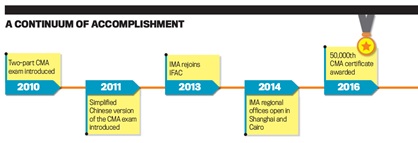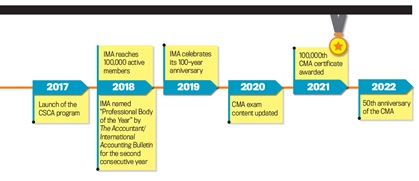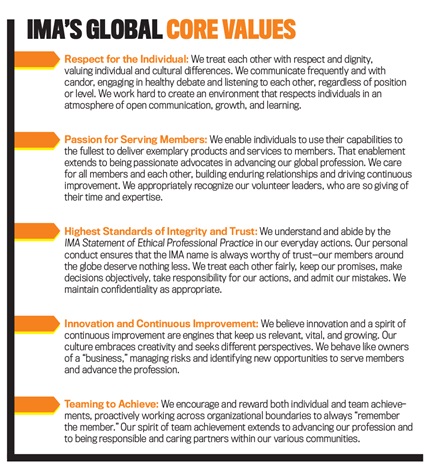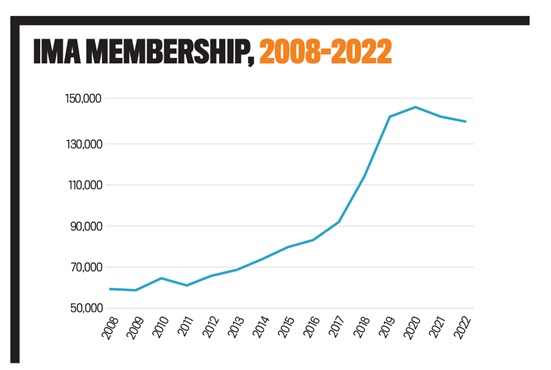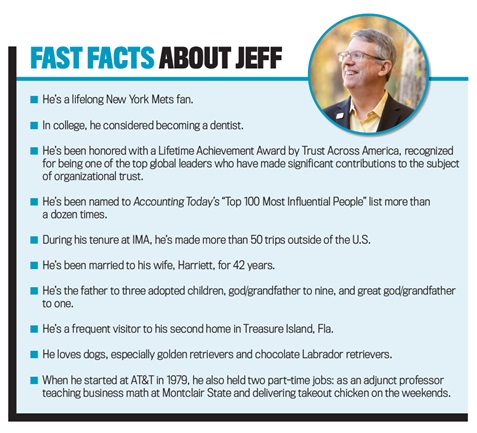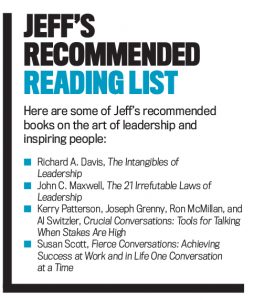After more than 14 years as president and CEO of IMA® (Institute of Management Accountants), Jeff Thomson will retire in 2023. During Jeff’s tenure, IMA has become a respected thought leader on emerging issues impacting the profession, achieved significant global expansion, partnered with leading organizations around the world, and grown the reputation of the CMA® (Certified Management Accountant) certification. A humble, inspirational leader, Jeff has guided the organization through impressive milestones and, in the last several years, unprecedented challenges. When Jeff departs IMA in the days ahead, he leaves behind an association that’s more resilient and better equipped to face the future than it’s ever been.
LEARNING THE SLIDE RULE
Jeff grew up the youngest of two boys in Wayne, N.J., a middle-class suburban town. He staunchly defends his home state and bristles at criticism of it: “It’s called the Garden State after all. People have stereotypes about New Jersey because they don’t really know how much the state offers.” (Cue crashing waves in Cape May, the state’s southern tip, and serene, wooded state parks up north.)
As a child, Jeff developed an early interest in math, inspired by his father, an engineer. “He taught me how to use a slide rule, which is pretty much a lost art now,” Jeff recalls. Jeff discovered in high school that he not only enjoyed math but was also good at it, and he took the most advanced classes, including honors calculus. When it came time to apply to college, he stayed close to home, attending Montclair State University less than a half hour from where he grew up. He majored in mathematics as an undergraduate, then immediately began and completed a master’s degree program in mathematics and statistics.
The aspect of math that most appealed to Jeff was the way it honed his ability to think thoroughly and logically. But while some of his classmates were interested in the theoretical aspects of the discipline, Jeff found he enjoyed the more practical side of the subject—the way that math, as he says, “can be applied to practically anything, be it music, arts, and, of course, business.”
AN EARLY DATA SCIENTIST
The opportunity to apply his math skills in a business setting came quickly to Jeff as he neared the end of his master’s studies. The classes in his program were small, only six or eight students, so he got to know his instructors well. One of his graduate-level professors, Tom Devlin, consulted for AT&T in Basking Ridge, N.J., and encouraged Jeff to consider a position with that company. “I interviewed for a job that was basically as a data scientist—although at the time, they didn’t call it that,” Jeff says.
Jeff began working at AT&T’s Analytical Support Center in July 1979, serving as an internal consultant for the rest of the organization. He conducted statistical analysis and data modeling (for example, building models to predict the market share and behaviors of AT&T’s long-distance competitors such as MCI (WorldCom) and Sprint), and provided support to various elements of the business—work that afforded him a sky-high view of the entire organization. He worked with Ph.D. statisticians, and his love for solving problems and providing strategic analysis grew considerably.
Jeff’s career at AT&T spanned four decades, from the late 1970s through the early 2000s. During that time, the company changed tremendously. When he first joined the organization, it was a regulated monopoly, controlling telecommunications in the United States. Within a few years of Jeff’s joining the company, however, the U.S. Federal Communications Commission broke up the monopoly, thanks to a 1982 consent decree that split the company into long-distance service and local-area service (the “Baby Bells”). The company that was once the sole player in the market was now facing competitive threats from many newcomers.
“We were suddenly thrust into competition, and it was a period of mergers, acquisitions, and divestitures. With one stroke of the pen, we were forced to become more nimble and agile. It was a great time to be part of a storied company like AT&T but a challenging one as well,” Jeff recollects.
Jeff eventually sought a position within the organization that made use of his analytical skills. Taking his love of applied math and his expertise in modeling and data analysis, he joined the finance and sales side of AT&T. His last position at AT&T was CFO of business sales, an $18 billion operation. That’s where he says he first learned that he wanted to “not just be a counter of beans, but a sprouter of beans”—that is, someone who takes a lead role in organizational value creation. Essentially, he helped provide financial analysis and business cases for major new product launches that forever changed the industry, including Digital One Rate (one of the first flat-monthly-fee-payment wireless plans) and the company’s Voice over Internet Protocol and Voice over Data products.
After 23 years at AT&T, Jeff decided to take advantage of a voluntary early retirement plan, as he had always wanted to give back and teach (along the way to achieving his degrees in mathematics, he also earned a certification to teach K-12 mathematics). Three days after “retiring” from AT&T in August 2002, he accepted a position teaching math at Mount Olive High School in New Jersey.
It’s a time Jeff recalls fondly. “I loved teaching math to teenagers. It was a privilege, influencing the lives of 27 very impressionable kids who needed some direction, inspiration, and, at times, tough love.” Because of his background, Jeff was assigned to teach advanced subjects, including honors calculus and a new course in statistics. He recalls it being a slower pace than the corporate world, but the flurried activities of the business office were replaced by demands from administration, parents, other teachers, and the teachers’ union. Navigating the sometimes-conflicting agendas of these different stakeholders helped Jeff hone his people skills—making him become a better listener and a consensus builder, which would prove valuable during his next professional opportunity.
COMING TO IMA
After nearly three years as a high school math teacher, Jeff joined IMA as vice president of research and practice analysis in 2005. He knew very little about the organization when he joined. The best part of that first IMA job was its similarity to the kind of work he most enjoyed at AT&T: serving in a market-facing role. Jeff conducted research on behalf of the profession and helped to expand the management accounting body of knowledge, authoring or coauthoring reports on topics such as leadership, risk management, and internal controls.
IMA was an organization undergoing significant changes at the time. The association had recently begun discussions about expanding into more international markets (one year after Jeff joined, IMA held its first global conference in Dubai, United Arab Emirates). But there were challenges, too: Membership and influence were falling dramatically, and the CMA certification wasn’t growing in the U.S.
An opportunity Jeff never imagined emerged in April 2008 when IMA’s then-president and CEO left IMA to pursue other interests. The IMA Global Board of Directors appointed Jeff, a member of IMA’s senior leadership team, to step in as CEO on an interim basis. It quickly became evident that Jeff had all the attributes required to helm the organization, and soon after he was unanimously selected by the Board to serve as IMA’s next president and CEO.
Reflecting on it now, Jeff recalls it was a weighty decision: “I definitely took a risk, but then again, so did the Board in appointing a math and finance guy as CEO. I never aspired to be CEO, but when the opportunity arose, I took it because I knew I could lead and, with guidance, make a difference. Plus, it helped that the senior leadership and members believed in me.”
CREATING A NEW CULTURE
Having never served in a CEO-type role for a professional association (or any organization, for that matter), Jeff recognized that he needed a strong network of advisors. It was a position that not only required inspirational leadership but a significant business turnaround as well. He sought guidance from former Global Board chairs and from other senior volunteer leaders, getting their input on things such as key actions—symbolic and tangible—to take in the first 30 days of leadership, the differences between leadership in a for-profit vs. not-for-profit volunteer organization, and more. He’ll always be grateful for their advice and support during that transition. Over the years as president and CEO, Jeff also expanded his own knowledge by earning three professional certifications: the CMA, the CSCA® (Certified in Strategy and Competitive Analysis), and the CAE (Certified Association Executive).
Chief among Jeff’s early priorities was composing a set of principles that would define what the association stood for and how it would achieve its goals. In November 2008, Jeff spent a weekend writing what would eventually become IMA’s Global Core Values, taking inspiration from AT&T’s values statement (“Our Common Bond”) and the Johnson & Johnson Credo while incorporating his own vision for how IMA should operate. After sharing his draft with the IMA Global Board of Directors, the senior leadership team, and the entire IMA staff (all but one of which were based in the U.S. at the time), the values were further refined and, eventually, institutionalized at IMA, reflecting the association’s commitment to its members, emphasis on ethics, and focus on innovation (see “IMA’s Global Core Values”).
Defining IMA’s core values helped to usher in change at a time when, in Jeff’s words, “We were in turnaround mode. We needed to take a hard look at what we were doing well and not doing well. We had to focus, in equal proportions, on cash—financial discipline to fund member benefits and services—and culture, the enduring ‘how’ of business achievement.”
The year Jeff became CEO, there were fewer than 17,000 CMAs, primarily located in the U.S. There had been discussions about expanding to other markets in prior years, but little progress had been made. Jeff and the senior leadership team quickly made growth in non-U.S. markets a top priority. They targeted key markets where the CMA certification would be in high demand, with China being the first.
“We opened our first office in China in 2010; today, we’re one of the largest professional associations in China,” Jeff says. China continues to be a strong market for IMA, helped by the decision in 2011 to translate the CMA exam into Simplified Chinese. Partnerships with state-owned enterprises, a cadre of member-facing Elite Clubs, and a solid network of review course providers led to rapid growth of the market in China in the years prior to the COVID-19 pandemic. Other global expansion followed under Jeff’s watch, with IMA opening offices in the Middle East, India, Europe, and Southeast Asia—in total, IMA now operates 12 offices outside of the U.S.
To this day, Jeff counts his one-on-one meetings with regional staff to be a highlight of his global trips, including his most recent visit to India in November 2022. “The team is so genuine, honest, and smart, with ready answers to my first two questions, which are always ‘How are you doing?’ and ‘What can I or HQ do to help you better serve your local members?’” he notes. Such dedicated regional team members, as well as the talented staff at global headquarters, embody IMA’s core values and ensure that “remember the member” remains at the forefront of every organizational decision.
AN ATTITUDE OF CARE
IMA’s circle of influence has grown thanks not only to the expansion of the CMA program around the world but also to IMA’s role as a thought leader and advocate within the profession. IMA has long been a leading voice in the profession, having been one of the five founding members of the Committee of Sponsoring Organizations of the Treadway Commission (COSO) focused on improved governance, internal controls, risk management, and fraud prevention in business. A key milestone of Jeff’s tenure was IMA’s 2013 reentry into the International Federation of Accountants (IFAC), the esteemed professional body for accounting organizations. Jeff personally has given years of service to IFAC, serving as IMA’s voting member on the IFAC Council. He’s also served as IMA’s representative on the International Integrated Reporting Council and, from 2006 until 2011, as a COSO board member. He rejoined the COSO board in the past few years and served as lead director, helping to guide COSO’s environmental, social, and governance (ESG) and sustainability initiatives, including working on a major study (due out in the first quarter of 2023) on applying the COSO Internal Control—Integrated Framework to build trust and confidence in ESG and sustainable business information. He’s also spearheading COSO’s succession plan for its board chair.
IMA also has taken a leadership role on significant issues impacting the profession, most recently with topics such as sustainability and diversity, equity, and inclusion (DE&I). The organization has produced numerous research reports and educational products on these topics, and key staff and volunteer leaders have served as spokespeople within the profession. “Both these issues are having a tremendous impact on our members and their organizations. Part of IMA’s role as a leader within the profession is to help build awareness and, especially, inspire action so that we can address these challenges head-on,” Jeff notes. In addition to these external initiatives, IMA as an organization is also committed to being part of the solution: IMA has launched its own internal DE&I initiatives, and even the recent decision to transition to primarily digital editions of Strategic Finance demonstrates the association’s commitment to sustainable business.
It isn’t surprising that the subjects of sustainability and DE&I have become so central to IMA during Jeff’s tenure. They align well with his style of servant leadership—a style of caring and empathy borne not just from his professional experience and education, but from his personal life as well. He and his wife, Harriett, adopted three teenagers, one from Uruguay, one from Ecuador, and one from New Jersey. Jeff is also caregiver to his older brother, Doug, who is mentally disabled.
“There’s no playbook for how to adjust to certain things in life,” Jeff explains. “That’s why it’s important to be able to adapt quickly to change and to be an active listener, willing to seek the counsel of others. I became a caregiver in my teens, instant Dad at the age of 40-plus, and CEO while in my 50s under unique and unexpected circumstances. I’ve been fortunate to have a caring network of friends and advisors.”
The ideal of mutual collaboration, tempered with a bit of friendly competition, has spawned a word Jeff uses frequently: “coopetition.” So, while he considers himself a competitive person, he likes to balance that by treating people with respect and care.
That attitude of care runs through Jeff’s (and the organization’s) attitude toward IMA members. “We must build a sustained relationship with them—and be there for them at every phase of their career journey,” Jeff says. “It’s important that we build that equity and that our members see that we deliver value to help them succeed in their professional endeavors.” In fact, meeting members has remained one of the elements of his role that Jeff most enjoys. “What I find touching is that for most members, meeting and taking a photograph with me is something special. They thank me so sincerely. To be honest, I’m more thrilled to meet them—they’re the reason we exist. I owe them thanks, not the other way around,” he says.
Jeff is especially proud of the way that IMA was able to respond to members’ changing circumstances during the COVID-19 pandemic, with programs like free continuing professional education and extending hardship waivers. “Compassion over commercialism” has been the mantra of IMA during this tough time.
A LASTING LEGACY
Despite much progress and a more than 100-year history, IMA has sometimes struggled with its image, Jeff admits. He points to the competitive challenges that the association has faced, most dauntingly in 2011 when the American Institute of Certified Public Accountants and the Chartered Institute of Management Accountants began offering the CGMA (Chartered Global Management Accountant) program. It prompted a period of deep evaluation—and inspired the CMA tagline, “You’ve got to earn it,” and a global advertising campaign that has now spanned seven years.
“We needed to pivot, and we did,” Jeff says. “We grew both in membership and CMAs in non-U.S. markets, and we’re now looking to India, Indonesia, and the Middle East as new areas of growth and to tapping into the U.S. market, which still has immense potential.”
Part of the challenge, according to Jeff, is to tell the story of IMA better. And what is that story? “Accountants really can change the world. We have the opportunity to make an impact on our organizations, their mission, and society at large. The role of the management accountant is to guide their organization through turbulence and disruption while investing in the organization’s future, and, if COVID has taught us anything, it’s that the unexpected can happen at any time.”
Jeff is also optimistic about the future of the profession. He quips that one day soon, the acronym CFO might be aptly translated as “chief futures officer” or “chief frontiers officer.” He considers advances in technology and automation—including AI, blockchain, and robotic process automation—as positive innovations that will create new opportunities for the accounting and finance leaders of tomorrow.
As for what’s next for Jeff, he plans to spend more time with his family—and to do things differently than he did before. “After AT&T, I had a job lined up almost immediately. This time, I’m going to see what happens.” He says Harriett jokes that he has few friends and no hobbies, but that isn’t true. He certainly has friends at IMA—members, staff, and colleagues who will always appreciate and respect his leadership. Of the legacy he leaves behind, Jeff is most proud of the culture he’s created—in his words, “a culture of care and collaboration”—that he hopes will continue beyond his departure.
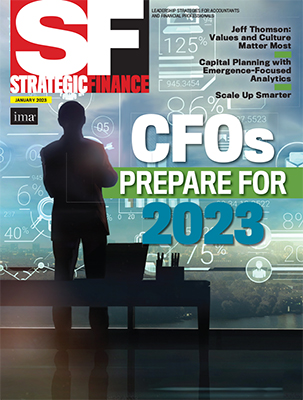
January 2023


